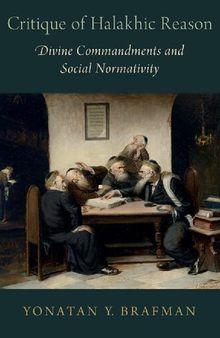 جزییات کتاب
جزییات کتاب
Norms and obligations are central components of many religious traditions. Yet they have often been neglected as objects of reflection in the study of religion relative to belief, experience, and even the related category of ritual. More surprisingly, despite the centrality of mitzvah (commandment) in Judaism, halakhah (Jewish law) has only recently become a central topic in modern Jewish thought. This book rectifies these deficiencies while forging new connections between reflection on religion and modern Jewish thought by offering what it calls a critique of halakhic reason. Such a critique delineates the rational constraints on the justification of the commandments and the practical consequences for their jurisprudence. It also asks whether uniquely "religious reasons" even exist and draws conclusions for several areas of study. Critique of Halakhic Reason offers fresh assessments of twentieth century Jewish thinkers, including Joseph Soloveitchik, Yeshayahu Leibowitz, and Eliezer Berkovits, as deeply engaged in reason-giving about the commandments yet simultaneously denying the normativity of practical reason. Against them, it contends that, when reasons are understood as generated by the structure of agency and the relations among subjects, they are the source of normativity. This constructivist theory of practical reason provides a basis for conceptions of authority, norms, and obligations that are applicable even to God's commands. Divine commandments too operate within a "space of reasons," and so are constrained by rationality and morality. Whether commandments are justified and how they are implemented depends on the reasons offered for and against them by humans. Reasons and practices of reason-giving are thus central to religious thought and life. Yonatan Y. Brafman examines the reasoning operative in the justification and jurisprudence of the Jewish commandments, and develops the consequences of reasoning for the study and philosophy of religion.



 دانلود کتاب
دانلود کتاب

 جزییات کتاب
جزییات کتاب





 این کتاب رو مطالعه کردید؟ نظر شما چیست؟
این کتاب رو مطالعه کردید؟ نظر شما چیست؟
